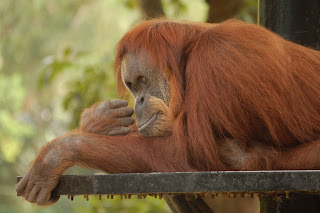
Important points that weren't mentioned in my article (due to space constraint):
If the volunteer program advertises say, "spend a week working in an Orang Utan/wildlife rehab center" here's food for thought:
According to Amy Corrigan, director of Zoo Check/Education of ACRES
"We have to be careful when promoting "cuddling" of any wild animal as generally all animal welfare groups are against the use of animals as "photo props" in zoos and tourist resorts on welfare grounds, and we need to make sure we don't have double standards.
Although the situation is different in a rescue facility setting, and the volunteers are not paying to have their photos taken with the animals, 'many will question what is the difference between taking a photo with an animal in a rescue facility or in a zoo/tourist resort?'
If animals are being rehabilitated to be returned to the wild we should be making them 'scared' of humans, so that they know to keep away from human settlements, and especially poachers. And there are many diseases which can quite easily be transferred between non-human primates and humans, including herpes, hepatitis and tuberculosis, so this is of concern. Of course, animals can bite too. In general, a "hands-off" policy should really be adopted when it comes to caring for and rehabilitating wild animals."

No comments:
Post a Comment